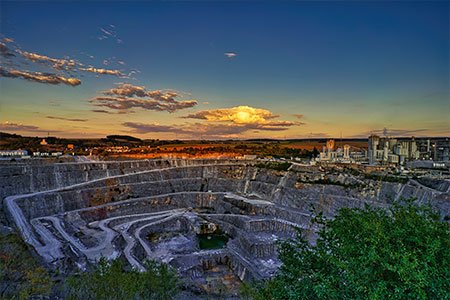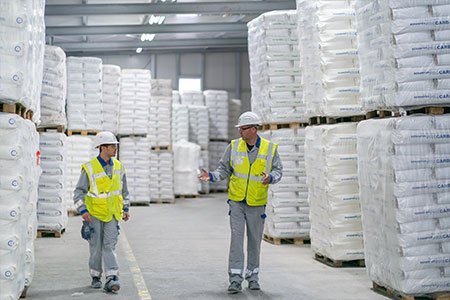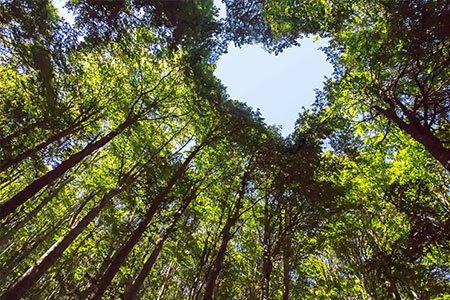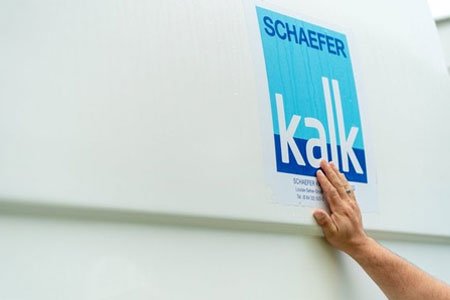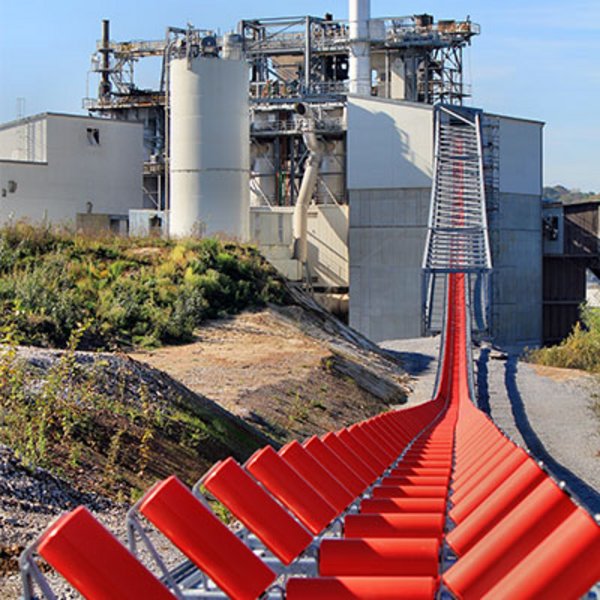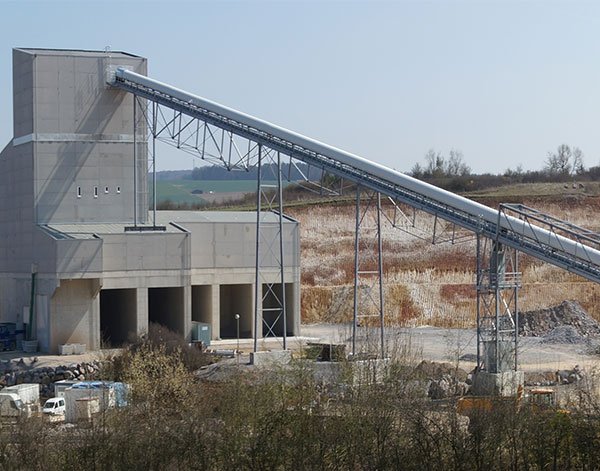After the Steeden plant underwent successive expansion and the new and upgraded aggregates were completed and commissioned in 2010, the year 2011 was dominated by improvements in kiln stone transportation. In November, an approx. 1.6 km long belt conveyor system replaced the stone transportation between the stone processing plant and the firing kilns by heavy-duty truck. Originally, this task was handled by a ropeway system. Over the years, its conveying capacity was repeatedly increased by adding additional buckets. Its speed was also increased several times, which worked well. Until 1973, when the entire ropeway system collapsed. Now the decision had to be made whether to repair the ropeway, which dated back to 1942, or to switch to alternatives. For many years, the haulage was then handled by diverse vehicles. The ever-increasing loads required significantly wider vehicles, however, which on the one hand made the traffic situation more and more difficult on the relatively narrow hauling road, and on the other hand the increasing axle loads were now causing considerable wear and tear to the old road. Not least out of environmental concerns, we decided to build an energy-efficient conveyor belt system instead of carrying out costly repairs to the hauling road.
2010-2020
What previous generations had considered good and proper remains the declared goal for the future for today's descendants in management: to preserve and continue to develop SCHAEFER KALK as a medium-sized family business. The necessary conditions for this are being created and further expanded both at home and abroad.
Steeden receives a conveyor belt system
Introduction of an energy management system
With the goal of systematically increasing energy efficiency in the company, we introduced an energy management system in accordance with DIN ISO 16001 / DIN ISO 50001 in 2011. These standards serve as guidelines for systematically analyzing energy consumption, for planning and implementing measures to optimize energy use, and for regularly monitoring the effectiveness of the measures taken. The energy management system thereby contributes to our company's continued development.
Clean room for the laboratory in hahnstätten
The Hahnstätten laboratory also features a new development. Since 2012, we have had a clean room there at our disposal. This makes it possible for the first time to develop products under controlled conditions that must meet very stringent purity requirements, for instance in the medical field. By taking various measures such as wearing special clothing, eliminating abrasion particles and air flows, providing sophisticated air treatment and optimizing processes, we are now able to keep within the maximum threshold concentration of approx. 350 particles per liter of room air permitted in a clean room and, in most cases, even to fall well below this level.
Construction of a parallel flow regenerative kiln in steeden
As a response to the ever-increasing demand for soft-burned lime, construction of a modern, energy-efficient PFR (parallel flow regenerative) kiln in Steeden was begun in 2013. To do this, two of the four standard shaft kilns first had to be demolished. A mammoth task for large equipment. Step by step, first the crane runway above the two kilns was shortened, then the brick lining was taken out. This was followed by segmental removal of the remaining steel shell and, last but not least, the final concrete demolition work. The new kiln was commissioned on schedule in mid-August 2015.
Raw materials industry sustainability award from the state of Rheinland-Pfalz
SCHAEFER KALK has always prioritized sustainability and in 2014 was once again awarded the Rheinland-Pfalz Raw Materials Industry Sustainability Award for sustainable practices in the extraction of raw materials. You can read in detail that we do not limit our sustainable practices to the extraction of raw materials in our Sustainability Declaration.
Haccp certification for Hahnstätten
In order to meet the demanding requirements of our customers in the food industry, we obtained HACCP (Hazard Analyses and Critical Control Points) certification for lime production at the Hahnstätten site in 2009. In 2013, the HACCP concept was extended to PCC products. In Malaysia, SCHAEFER KALK made use of the even purer limestone deposits to go one step further and was able to obtain GMP (Good Manufacturing Practice) certification in 2014, which is necessary for supplying pharmaceutical customers. New laboratory software was installed for this purpose in Malaysia a year later.
New processing plant at the Merschelbruch quarry
In the same year, 2015, the new processing plant at the Merschelbruch quarry was completed and linked to the Hahnstätten plant via the transport bridge.
Construction of a HACCP-compliant lime milk plant
To be able to meet the lime milk and PCC requirements of food and pharmaceutical customers in a separate facility, an HACCP-compliant lime milk plant was built in 2016.
New product line for the feed industry
With successful GMP+ certification of the Hahnstätten and Diez sites in 2016 and our subsequent marketing of the SCHAEFER PRECAfeed® product line, we became a manufacturer of raw materials for feed production.
20th anniversary for Schaefer Kalk Malaysia
SCHAEFER KALK (Malaysia) celebrated its 20th anniversary in 2017. After the foundation and construction phase in 1995 and 1996, kiln 1 was fired up in 1997. After the first few difficult years, business has progressively expanded over the past two decades and today makes a significant contribution to the success of the SCHAEFER KALK Group. The third kiln, with a daily yield of 150 tons of lime, was commissioned in October 2017.
New production facility at the China site
A lot has been happening at the SCHAEFER KALK site in China as well these last few years. Following construction of the new production facility and relocation of the entire plant to Huzhou, production of PCC slurry began in 2019. Construction of the PCC drying plant was completed and production commenced in 2020.
Foundation of the joint venture Schaefer Koehler Onsite GmbH
In Germany, SCHAEFER KALK founded the joint venture Schaefer Koehler Onsite GmbH and began construction of the PCC plant at the Kehl site in the fall of 2017. The plant was successfully commissioned in 2019.
